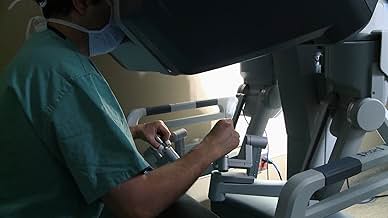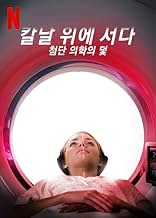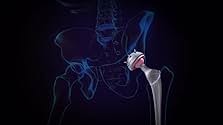AVALIAÇÃO DA IMDb
7,6/10
3,2 mil
SUA AVALIAÇÃO
Adicionar um enredo no seu idiomaA look at the unforeseen consequences of advanced technological devices used in the medical field.A look at the unforeseen consequences of advanced technological devices used in the medical field.A look at the unforeseen consequences of advanced technological devices used in the medical field.
- Prêmios
- 2 vitórias e 2 indicações no total
Michael Carome
- Self - Director, Public Citizen Health Research Group
- (as Dr. Michael Carome)
David Kessler
- Self - FDA Commissioner, 1990 -1997
- (as Dr. David Kessler)
Stephen Tower
- Self - Orthopedic Surgeon
- (as Dr. Stephen Tower)
Adriane Fugh-Berman
- Self - Professor of Pharmacology & Physiology Georgetown University
- (as Dr. Adriane Fugh-Berman)
Deborah Cohen
- Self - Associate Editor, British Medical Journal
- (as Dr. Deborah Cohen)
Rita Redberg
- Self - Editor, JAMA Internal Medicine
- (as Dr. Rita Redberg)
Robert Bridges
- Self - Diagnostic Radiologist
- (as Dr. Robert Bridges)
- Direção
- Roteiristas
- Elenco e equipe completos
- Produção, bilheteria e muito mais no IMDbPro
Avaliações em destaque
Very well done documentary about medical devices and the people that have had their lives ruined because of several very flawed devices. The FDA's reputation is on the line here and I think I will never be surprised again when the FDA messes up and okays a product for medical use that should never been approved. The loop hole they utilize to circumvent more study and more experiments should have been closed decades ago. Instead, more and more companies use the loopholes to get their product on the market when they never should have been. It all seems to lead back to greed. Big bucks to be had in this industry for sure.
I thought it was well written and easy to follow. But more importantly, I think the message about the medical devices is impressive because it educated about the many adverse reactions medical devices cause in human bodies in some or more than some people. I also was very interested in hearing the patients stories told by the actual patients and also where the people ended up. Very sad actually.
I thought it was well written and easy to follow. But more importantly, I think the message about the medical devices is impressive because it educated about the many adverse reactions medical devices cause in human bodies in some or more than some people. I also was very interested in hearing the patients stories told by the actual patients and also where the people ended up. Very sad actually.
If there's a film that can literally save lives, this is it.
Disturbing, shows the corruption of the medical industry which is very scary, can't believe it's happening in the world. If you're like me and always had little trust in doctors, this will make you hate them for sure
For those who aren't too put off by a few facts now and then, here's the chronology:
Essure was approved in 2002.
By 2010, everyone who pays attention to these things was painfully aware of the growing number of reports of safety issues associated with the device, and problems with other implants were also getting attention.
The head of FDA's Office for Device Evaluation resigned in 2010. A number of other top FDA medical device officials resigned in the 2009-2012 time period.
The Institute of Medicine did an extensive evaluation of the 510(k) process and, in July 2011, released a 245-page report with criticisms and recommendations.
Congress took the IOM recommendations to heart and, in July 2012, the Food and Drug Administration Safety and Innovation Act was enacted into law. It including the most significant legislation affecting the regulation of medical devices since the 1976 legislation that first gave FDA authority over the safety and efficacy of these products.
Whether the extensive changes that were included in the 2012 legislation will be effective in reducing the number of medical devices that are associated with safety issues post-market, only time will tell. But FDA oversight of medical devices has been under new management and new regulations for over five years now.
In 2016, FDA required Bayer to include a "black box warning" on Essure. A black box warning is also known in the industry as the "kiss of death," because of its typical impact on sales. So it came as no surprise to anyone, when, on July 20, Bayer announced it was withdrawing the product from the US market, due to declining sales.
The documentary was released on Netflix one week later. Hmmm. I wonder if Netflix might have held it for release because, in order for Bayer to sue for libel, it would have had to show that it incurred damages as a result of the libel. Now that there are no sales to be lost, no damages can be incurred.
Essure was approved in 2002.
By 2010, everyone who pays attention to these things was painfully aware of the growing number of reports of safety issues associated with the device, and problems with other implants were also getting attention.
The head of FDA's Office for Device Evaluation resigned in 2010. A number of other top FDA medical device officials resigned in the 2009-2012 time period.
The Institute of Medicine did an extensive evaluation of the 510(k) process and, in July 2011, released a 245-page report with criticisms and recommendations.
Congress took the IOM recommendations to heart and, in July 2012, the Food and Drug Administration Safety and Innovation Act was enacted into law. It including the most significant legislation affecting the regulation of medical devices since the 1976 legislation that first gave FDA authority over the safety and efficacy of these products.
Whether the extensive changes that were included in the 2012 legislation will be effective in reducing the number of medical devices that are associated with safety issues post-market, only time will tell. But FDA oversight of medical devices has been under new management and new regulations for over five years now.
In 2016, FDA required Bayer to include a "black box warning" on Essure. A black box warning is also known in the industry as the "kiss of death," because of its typical impact on sales. So it came as no surprise to anyone, when, on July 20, Bayer announced it was withdrawing the product from the US market, due to declining sales.
The documentary was released on Netflix one week later. Hmmm. I wonder if Netflix might have held it for release because, in order for Bayer to sue for libel, it would have had to show that it incurred damages as a result of the libel. Now that there are no sales to be lost, no damages can be incurred.
I can't remember being more shocked watching a documentary since Food Inc. The Bleeding Edge is deeply involving, showing struggles of real people instead of only bombarding viewers with dry facts. You could think that accidents may happen, but the idea that FDA and medical industry could willingly manipulate, cheat and lie to gain as much profit as possible is sickening - and yet it's a reality. Yes, you should research every medicine, every medical device you put in your body, every medical procedure you undergo. Nevertheless, not everyone does, not everyone would think to doubt their doctor's decision - in fact, most people would probably do what they were told. Films like this one are extremely important. Bayer is withdrawing Essure and hopefully they'll be more changes on the way.
Você sabia?
- CuriosidadesEssure, the medical device at the center of the exposé, was discontinued for good in the US in 2018.
Principais escolhas
Faça login para avaliar e ver a lista de recomendações personalizadas
- How long is The Bleeding Edge?Fornecido pela Alexa
Detalhes
- Tempo de duração
- 1 h 39 min(99 min)
- Cor
- Proporção
- 1.85 : 1
Contribua para esta página
Sugerir uma alteração ou adicionar conteúdo ausente






















